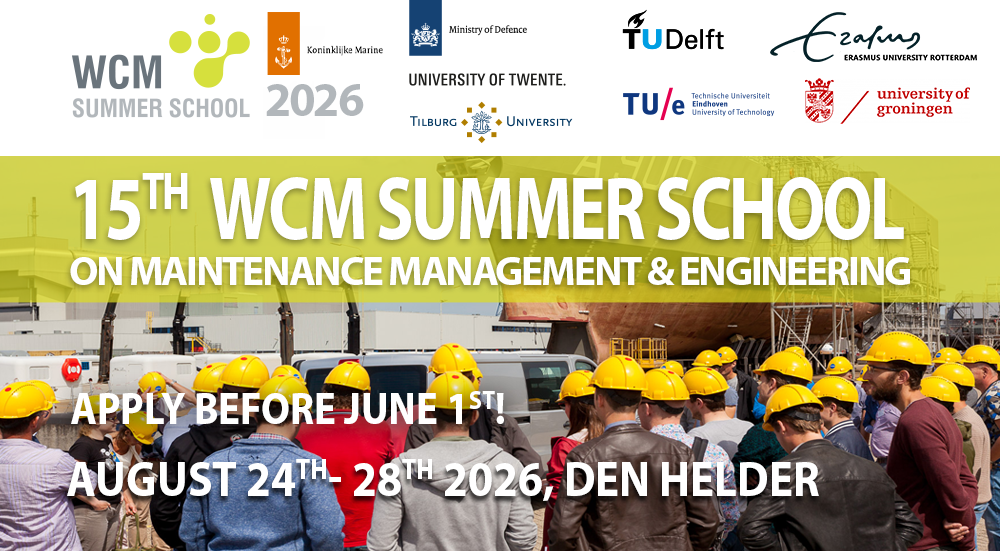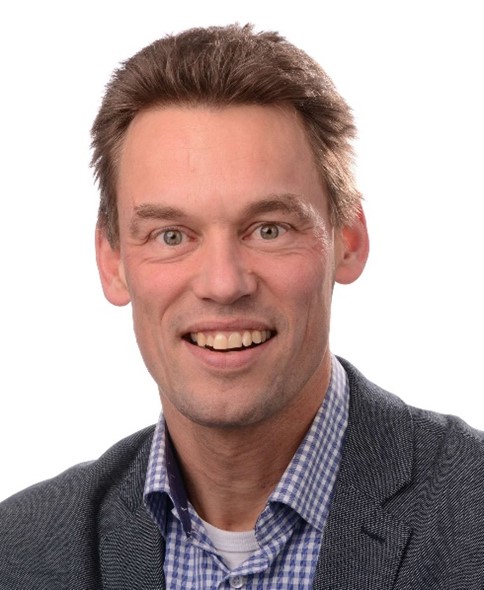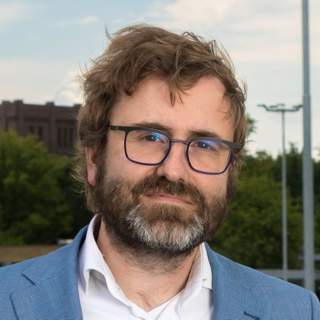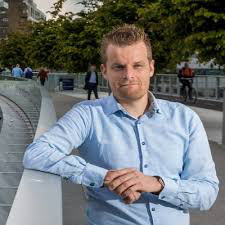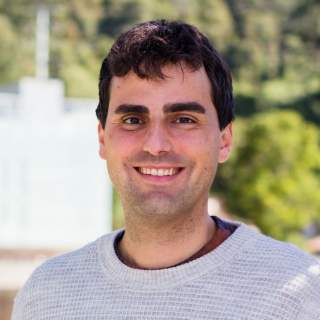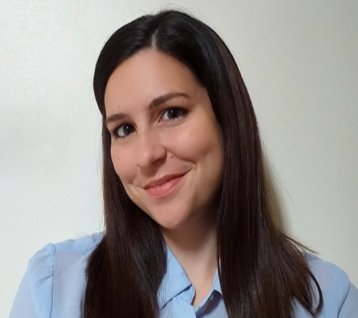The following lecturers are participating in the WCM Summer School:
- Prof.dr.ing. Willem van Groenendaal
- Prof.dr. Henk Akkermans
- Prof.dr.ir. Tiedo Tinga
- Prof.dr. Jan Braaksma
- Dr. Chris Rijsdijk
- Prof.dr. Marielle Stoelinga
- Dr.ir. Rob Basten
- Dr. Wieger Tiddens
- Jacob Derks, MSc
- Dr.ir Willem Haanstra
- Giacomo Barbieri, PhD
- Maricruz Solera Jiminez, PhD
Prof.dr.ing. Willem van Groenendaal
(University of Tilburg)
Willem van Groenendaal is an expert in the field of decision support, investment analysis and policy evaluation. He combines his academic research on policy support with applied work in projects all over the world (Bangladesh, Costa Rica, China, Indonesia, etc.).
Prof.dr. Henk Akkermans
(University of Tilburg / World Class Maintenance)

Henk Akkermans holds the chair on Supply Network Dynamics at Tilburg University, Tilburg School of Economics and Management and is the Director of World Class Maintenance. His research in maintenance focuses on how to organize effective outsourcing arrangements in maintenance settings, on how to organize effective processing of sensor data in Condition-Based Maintenance settings and on improving behavioral decision-making in dynamically complex maintenance settings. His academic background is in information management (TiU) and industrial engineering (TUe).
Prof. dr. ir. Tiedo Tinga
(Netherlands Defence Academy)
Tiedo Tinga is full professor Life Cycle Management at the Netherlands Defence Academy (NLDA) in Den Helder, as well as full professor Dynamics based Maintenance at the Engineering Technology department of the University of Twente. He holds a MSc in Material Science from the University of Groningen, a PDEng in Materials Technology from TU Delft and a PhD in computational mechanics from Eindhoven University of Technology.
Tinga has been working with the National Aerospace Laboratory NLR for 10 years as a senior scientist. He was involved in research projects on structural integrity, fracture mechanics, computational mechanics and life prediction. In 2007 he joined the Netherlands Defence Academy as associate professor Maintenance Technology. There he is involved in educating the future officers of the Dutch Air Force, Army and Navy, and also leads a number of research projects on predictive maintenance. Since 2012, he combines this position with the part-time full professorship at the University of Twente. Since 2020 he also leads the Knowledge Center Smart Maintenance at the Royal Netherlands Navy, aiming to apply new maintenance technologies in practical cases.
His research focuses on improving the predictability of failures, aiming to improve preventive maintenance processes and to develop advanced predictive maintenance concepts. The research has a solid basis in understanding and modelling the physics of failure, which is combined with the development of advanced health and condition monitoring techniques and data analysis procedures. The research is applied to assets in various sectors of industry, including defence, transport, aerospace, maritime, process industry and infrastructure.
Tiedo now leads research programs on maintenance at both institutes and has been (co-) supervising 30 PhD and PDEng students in the past 10 years. Tiedo has published around 100 papers in international ISI journals and conferences. He has also been actively involved in the initiation (funding) and execution of many research projects, which are in close cooperation with industry and scientific partners.
Prof.dr. Jan Braaksma
(Director WCM Summer School)
Jan Braaksma is the director of the WCM Summer School part of World Class Maintenance and is Adjunct Professor and manager of the chair of Asset Management & Maintenance Engineering at the University of Twente. He has worked for the University of Groningen (RuG) and the Dutch Defense Academy (NLDA). He holds a Master’s degree in Business and ICT and a PhD degree in Economics and Business.
Jan’s research focuses on Asset Management and Maintenance Engineering with special attention for maintenance concept design, Smart Maintenance and Sustainable Asset Management, including life cycle planning and systems thinking.
A significant part of his research is in cooperation with companies and organisations such as Liander, ProRail/ NS, Netherlands Railways (NS), Strukton Rail, Heineken, AkzoNobel, Sitech, Huntsman, Heijmans, Sabic, TataSteel and the Ministry of Defense.
Dr. Chris Rijsdijk
(Netherlands Defence Academy)
Chris Rijsdijk is an assistant professor at the Netherlands Defence Academy. His main research interest has been directed towards “data driven decision support”.
Working in a military context, most of his case studies confine to maintenance decisions that may be supported by sensor data, but he has also been working at cases from industry.
Jacob Derks, MSc
(Tilburg University/World Class Maintenance)

Jacob Derks is a project developer at WCM. A lot of his work revolves around the application of digital technologies to support asset management decision making (e.g. Virtual and Augmented Reality technologies, Artificial Intelligence and Data Analytics technologies).
In addition to WCM, Jacob is currently writing his doctoral dissertation at Tilburg University in the area of innovation management and works at the university as a lecturer in the areas of organization, strategy and supply chain management. During the summer school, Jacob assists with the organizational and practical tasks to be done.
Prof.dr. Marielle Stoelinga
(University of Twente / Radboud University of Nijmegen)
Professor of Risk Management for High-tech systems
How do we design our robots, nuclear plants, railway systems and heart monitors such that they are safe and reliable? How do we make sure that data centers and water supply systems are aways available?
I am developing quantitative risk assessments methods that ensure that the risks related to high tech systems lie within acceptable boundaries. I develop techniques to analyze, predict, improve reliability of complex systems, using fault trees, model-based testing, and architectural reliability modeling.
Technically, distinguishing feature of my techniques is compositionality: I derive risk profiles from a complex systems from component risk profiles, using powerful techniques from model checking. This makes life easy, flexible and fast.
Further, I am the director of Life Long Learning at EEMCS.
Dr.ir. Rob Basten
(Eindhoven University of Technology)
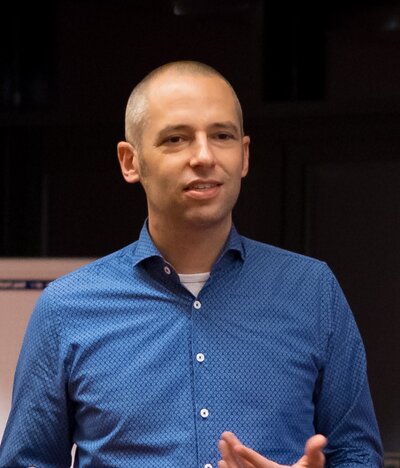
Rob Basten is an Associate Professor at the Eindhoven University of Technology (TU/e) where he is primarily occupied with maintenance and service logistics and its interfaces. Most of his research focuses on after sales services for capital goods: maintenance policies and maintenance optimization, spare parts inventory control, and design of after sales service supply chains. He is especially interested in using new technologies to improve after sales services. For example, 3D printing of spare parts on location and using improved sensoring and communication technology to perform ‘just in time’ maintenance. He is further active in behavioral operations management, trying to understand how people can use decision support systems in such a way that they actually improve decisions and add value. Many research projects are interdisciplinary in order to carry out high quality research and solve problems in practice. For the latter reason, research is typically performed in cooperation with high-tech industry: companies such as ASML, Océ, Vanderlande and Marel Stork. Experience with industry is also used in teaching, for example in the course Maintenance & Service Logistics.
Dr.ir. Wieger Tiddens
(Royal Netherlands Navy)

Wieger Tiddens is working for the Royal Netherlands Navy as innovator Smart Maintenance. He has obtained his PhD in the field of maintenance technology at the University of Twente and the Netherlands Defence Academy.
After his studies in Technology Management at the University of Groningen, he gained professional experience in the application and development of maintenance concepts and techniques within industry. In his PhD research, with his dissertation entitled “Setting Sail Towards Predictive Maintenance”, he focused on the organizational, as well as the technical aspects of the application of Predictive Maintenance to support informed maintenance decision making.
In his current role, he works within the ‘Data for Maintenance’ group on developing smart maintenance at the Royal Netherlands Navy. He especially concentrates on the application of maintenance analytics (i.e. Data Science) to improve the operational readiness of the Navy.
Dr.ir. Willem Haanstra
(University of Twente)
Willem Haanstra is an Assistant Professor in the chair of Asset Management & Maintenance Engineering at the University of Twente. He holds an MSc in Industrial Design Engineering and a PhD in Asset Management, both from the University of Twente. Within the AMME chair, Willem leads the research direction of Sustainable Asset Management which focuses on the strategic management of physical systems over their entire lifespans to ensure the long-term viability of these assets concerning financial, environmental, and societal impacts.
Willem’s research on Sustainable Asset Management focuses on the intersection of the technically oriented world of Asset Management and the broader field of Sustainable Development. Sustainable Asset Management aims to apply Life Cycle Engineering principles to evaluate and improve the financial, environmental, and social impact of technical systems over their entire life cycle. It promotes the adoption of assessment methods and strategies from the Circular Economy to enable sustainable resource use. It adopts a long-term, strategic outlook on how physical systems can adapt to socio-technical challenges such as climate adaptation, resource depletion, technological change, or the energy transition.
As an engineer-turned-researcher, Willem likes to bridge the worlds of theory and practice by not only designing methods and tools for Sustainable Asset Management but also evaluating and using them in practice, often in close collaboration with experts from industry. Previous collaborations include partners from the manufacturing, energy, and transportation sectors
Giacomo Barbieri, PhD
(University of Twente)
Giacomo Barbieri is an Assistant Professor in the Asset Management and Maintenance Engineering Chair at the University of Twente (Netherlands). He earned his bachelor’s and master’s degrees in Mechanical Engineering (2010 and 2012, respectively) and a Ph.D. in Industrial Innovation Engineering (2016) from the University of Modena and Reggio Emilia (Italy), in collaboration with Tetra Pak SpA. During his Ph.D. research, he also conducted internships at UC Berkeley (US), the Technical University of Munich (DE), and the University of Exeter (UK), enriching his international perspective on engineering and innovation. From 2016 to 2023, he served at Universidad de los Andes (Bogotá, Colombia), before moving to the Netherlands in 2024.
Giacomo has a background in mechanical engineering and industrial automation, which has progressively shaped his research focus in Asset Management, Smart Maintenance, Co-Design, and Decision Making. He thrives in transdisciplinary environments, where he facilitates human-centric and value-based approaches to these technological fields. Currently develops projects with companies in the areas of railway transportation, energy distribution and generation, and infrastructure and water management.
Maricruz Solera Jiminez, PhD
(Postdoctoral Researcher: Human-Centric Technology)
Maricruz is a Postdoctoral Researcher at the University of Twente, specializing in the deployment of human-centric technology for the digital transformation of the railway sector. She contributes to Europe’s Rail Joint Undertaking (ERJU) Flagship Project 2 – R2DATO, focusing on participatory migration frameworks for autonomous train operations.
She holds a PhD in Landscape Architecture and Spatial Planning from Wageningen University, where she led the development of Plant Pixel—a modular green façade system designed for circularity, low embodied carbon, and cost-effectiveness. With over eight years of international experience in sustainable architecture, stakeholder engagement, and EU innovation projects, she is committed to translating research into practical, real-world impact.
